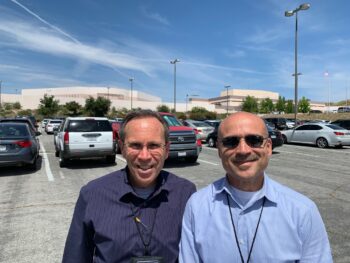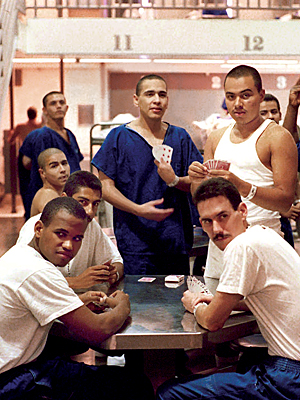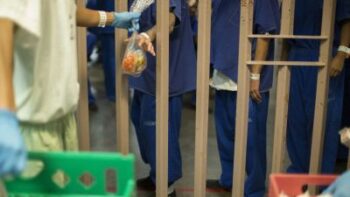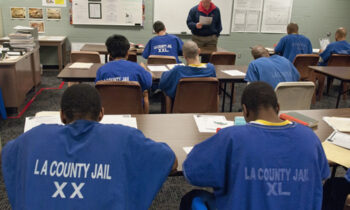
By Michael Ashcraft —
In here, “going to the bars” doesn’t mean a night of throwing back drinks at the clubs.
No, here in the jailhouse, it means approaching the 3”-diameter, 12-foot high square bars and talking face to face with some of the most dangerous criminals in Los Angeles County: murderers, armed robbers and human traffickers.
Senior chaplain Frank Mastrolonardo, 62, goes up to the bars and asks inmates about the progress of their cases and about their families. He prays for them and urges them to complete a “Fundamentals of the Faith” booklet so they can get a free Bible to while away the hours.
Some of these men don’t come off as dangerous. Instead, they recount deeply moving stories of how they fell into trouble. These are men who suffered trauma in broken or violent homes as children. They grew up to perpetuate the cycle of evil. They got caught and wound up here, in North County Correctional Facility, also known as “SuperMax” in Castaic, California, where they are held until their court case is completed.

One inmate, Victor*, cried as he admitted he was a former assistant pastor, who backslid into alcohol and drugs after his 21-year-old daughter died in an auto accident. He had walked in sobriety 24 years. “I broke my own rule: Don’t go a day without reading the Word or without praying,” he said. After the tragedy, he started frequenting his mother’s house, where there was continually partying and substance abuse.
Victor smiled when he received from Chaplain Frank the study Bible on the recent visit.
Walking at a brisk pace, Frank pushes a cart of Christian literature through the hallways leading to the cellblocks. He follows up on visitation request forms and typically walks three miles in the hallways. On this day, he’s visiting dorms for high risk offenders.
The men sleep three bunks high against the wall in double story hall rooms that house 60-90 men. There are metal tables and benches in the central area where they watch T.V. or exercise. One shower, blocked by a wall only waist high, is enough for every man, taking turns all day long.
The hall rooms are built in a cluster, three around a central pod where a sheriff’s deputy keeps an eye on all. Four deputies walk through doing a visual inspection daily.
 With so many troubled men with violent tendencies all housed in close quarters, fights happen frequently. On the day of this reporter’s visit, one inmate was being escorted to medical attention, his face swollen from blows. The official account of what happened? He fell off his bunk. But the swelling could have just as easily resulted from a thrashing.
With so many troubled men with violent tendencies all housed in close quarters, fights happen frequently. On the day of this reporter’s visit, one inmate was being escorted to medical attention, his face swollen from blows. The official account of what happened? He fell off his bunk. But the swelling could have just as easily resulted from a thrashing.
“Jail is not the place people want to come,” said Chaplain Steve Borja, 66, who accompanied Frank that day. “You take them from the trauma they have suffered in their childhood and the trauma they have caused on the streets and put them into a situation where they face trauma of threats and violence in jail. They’re in constant fear here.”
In 2006, race riots broke out when Latino inmates, following orders from organized crime leaders outside the jail, ordered them to attack African-American inmates for no other reason than racial animosity. They threw furniture down from the second story on unsuspecting inmates. Four hours of rioting was quelled only by sheriff’s deputies who used tear gas and rubber bullets. One inmate was killed and 100 others injured.
Chaplain Dan, who works under Frank, says Christian groups have been instrumental in keeping peace since then. They have prayed for their fellow inmates, and defended victims regardless of race, he says.
 NCCF houses 4,200 inmates, who wear blue sweatpants, neon green shorts, a T-shirt and Croc-type rubber slippers. Some have white tennis shoes. Each year, 300,000 prisoners cycle through the facility. NCCF is considered a model facility. Opened in 1990, it offers to lower level offenders high school instruction and classes in sewing, printing and baking that supply in-house needs.
NCCF houses 4,200 inmates, who wear blue sweatpants, neon green shorts, a T-shirt and Croc-type rubber slippers. Some have white tennis shoes. Each year, 300,000 prisoners cycle through the facility. NCCF is considered a model facility. Opened in 1990, it offers to lower level offenders high school instruction and classes in sewing, printing and baking that supply in-house needs.
As he wheels his cart through the hallways, Frank gets peppered with requests for literature. The inmates are bored sitting around hours each day with nothing to do. He resists the temptation to hand it out freely. His ministry has limited resources. Plus, they have found inmates using Bibles as weights for lifting. He insists that the detained men first need to complete a booklet on the basics of Christianity to earn the right to the free Bible. He also keeps careful records, lest an inmate argue he never got his Bible and wind up with two.
“The Word of God is the only thing that is going to transform a person,” Frank says. “The programs are helpful, but it’s Jesus.”
Frank started 40 years ago performing services in jail once a month. After 18 years of volunteering while working in electronics, he went full time, set up a non-profit, Only Hope Prison Ministries, and became a chaplain. Today, he’s LA County’s liaison for all Protestant groups in all eight jail facilities. At NCCF, they host some 20 services.

Their needs are so pressing they need more volunteers to reach all the cell blocks.
In his decades of service, he’s seen the prison population transition from mostly older men to youngsters, who get swept up in gangs, drugs and the “fast life.”
Sadly, drugs often reach inmates from the outside. Some worker(s) — maintenance, religious, cleaning, teaching staff — are supplying the inmates. Steve points out that if the deputies were to employ a drug-sniffing dog at the front entrance, they would halt the inflow of illegal substances.
Each dorm room has its de facto leader, or “shot caller,” who imposes rules on everyone in his dorm and even helps the deputies. Usually he’s the toughest and meanest guy.
Frank remembers one mad-dog gangster from Pacoima growling at him on a service day: “What do you want?”
Frank replied that he wanted to invite inmates to a church service in the adjacent “day room.” The shot caller responded, “Christian? Oh, my sister is into that stuff,” and immediately ordered his entire hall room to wake up and attend Frank’s service. All 60 inmates obeyed and filed out.
Relationships are key in the process of Holy Spirit-led, Bible-guided transformation, Steve says. Steve and Frank try to visit his guys frequently and challenge them to stay on track with the program of Bible study booklets. They’re breaking the cycle of trauma.
“Chaplains try to get these men to heal,” Steve says. “The Gospel offers hope. They need to recognize their sin. Then we visit them constantly to build relationship. That’s where the life transformation occurs — with a shepherd guide. We lead them from redemption to service.”
The Mexican Mafia exploits the vulnerabilities of inmates — and leverages its projected power — to recruit lifelong foot soldiers through the jail system, Dan says.
With $2,000 worth of donated books and materials, the inmates can go through 16 modules of seminary level training and emerge from jail, no longer to steal but to steal souls from the devil.
“Instead of coming out as committed foot soldier for the mafia, they are following Christ,” Dan says.
*name changed.
 No photography was allowed inside the facility, so pictures are stock photos from Internet, with the exception of the picture of Chaplains Frank and Steve.
No photography was allowed inside the facility, so pictures are stock photos from Internet, with the exception of the picture of Chaplains Frank and Steve.
Michael Ashcraft is the CEO of Cuisine Natural bamboo steamers, which is his attempt to support his writing ministry.




Very interesting article about inmates. Thank you for all the research and time you took to educate me, the reader. Gives me a Godly perspective on what is happening in the jails and how God is using Christians to transform lives.
Comments are closed.